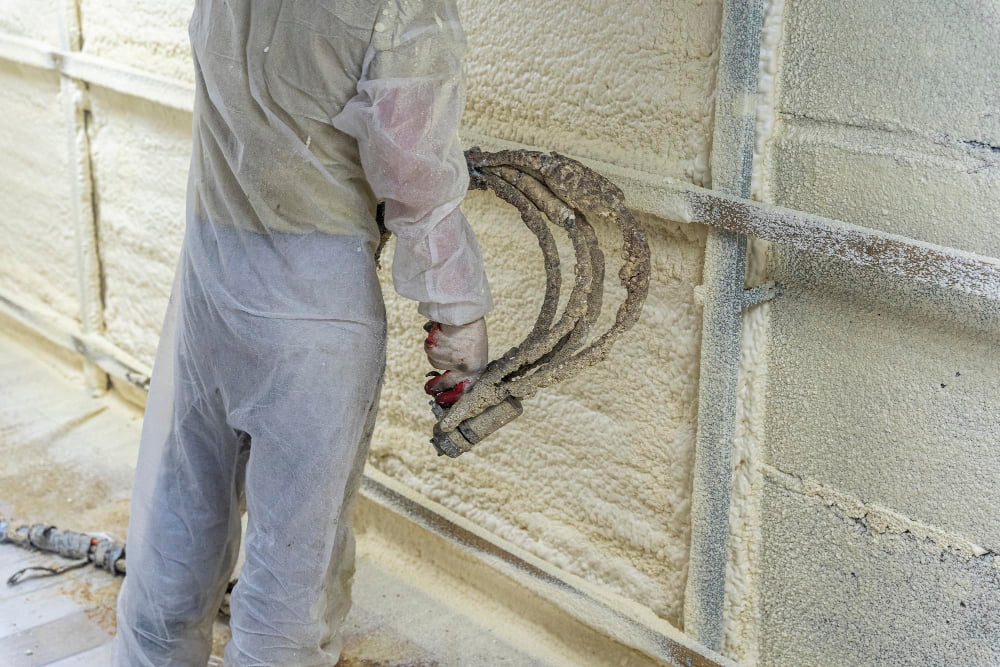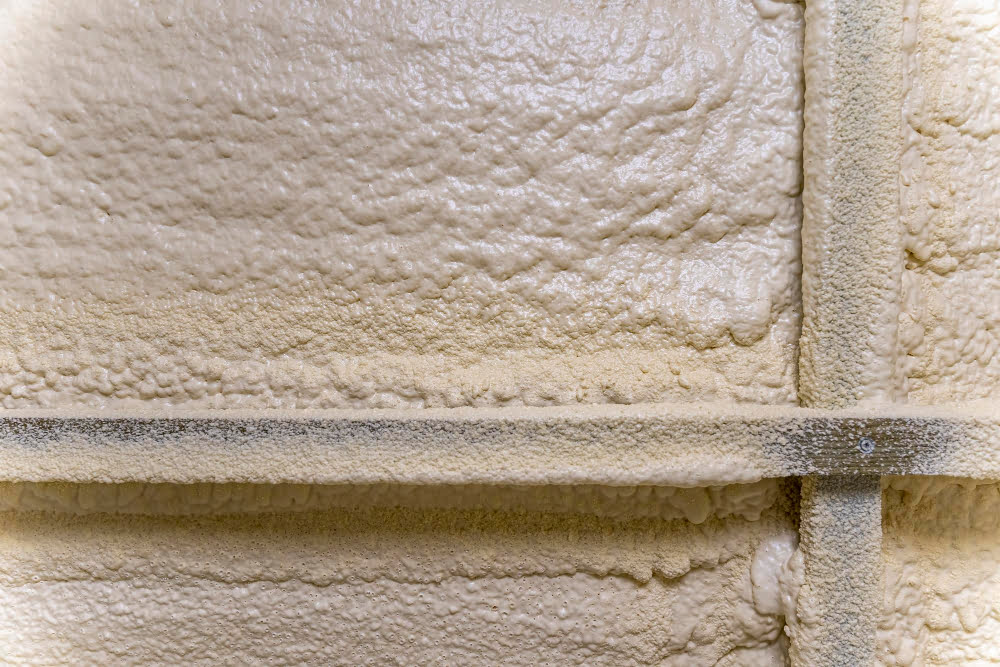Yes, spray foam insulation can effectively be used on metal buildings.
Spray foam insulation indeed works effectively on metal buildings, providing an array of benefits such as energy efficiency, temperature control, and moisture prevention.
This article will delve into how spray foam insulation interacts with metal structures, the installation process, its advantages, and considerations to keep in mind.
By the end, you’ll have a comprehensive understanding of why spray foam insulation is a viable choice for your metal building.
Key takeaways:
- Spray foam insulation effectively works on metal buildings
- Provides energy efficiency, temperature control, and moisture prevention
- Creates an air-tight seal and reduces energy consumption
- Acts as a moisture barrier and deters mold growth
- Improves temperature regulation and reduces condensation buildup
Powerful Insulator for Metal Buildings

Spray foam insulation demonstrates unmatched performance when used in metal buildings due to its expansive nature. This makes it more efficient than traditional insulation methods.
With the capacity to tightly seal all nooks, crannies and crevices, the insulation effectiveness significantly excels. The elimination of gaps ensures consistent thermal comfort throughout the building.
Consequently, the structure’s indoor environment retains stable temperature levels, significantly reducing energy consumption and subsequent costs. Additionally, the superior insulation quality helps to decrease the audible impact of external noise, providing a quiet and productive internal environment.
Incredible Energy Savings With Spray Foam Insulation On Metal Structures

Spray foam insulation substantively reduces energy consumption, offering an average of 50% or greater energy savings compared to other types of insulation. Its expansive nature allows it to tightly seal all nooks, crannies, and crevices in a metal building that would otherwise remain exposed.
1. High R-Value: The effectiveness of an insulating material is measured by its R-value – the higher, the better. Spray foam insulation has an outstanding R-value, making it a superior choice for energy efficiency.
2. Complete Seal: Unlike other insulation options, spray foam expands, filling gaps and creating a comprehensive seal. This reduces air leakage, an often overlooked source of energy loss, ensuring optimal thermal insulation.
3. Reduction in HVAC Size: With an expertly insulated building, a smaller, more energy-efficient HVAC system can be used, reducing energy demands and operational costs.
4. Long Lifespan: The durable nature of spray foam insulation means it maintains its effectiveness longer than standard insulation, reducing the frequency, and thus the energy costs, of replacement.
Remember, these savings aren’t just beneficial for the environment but also for your wallet. Less energy usage equates to lower utility bills.
Creating an Air-tight Seal With Spray Foam Insulation for Metal Buildings

Spray foam insulation adheres directly to the surface of the metal building, expanding upon application to create a complete, air-tight seal. This filling process eliminates the presence of gaps, holes or air leaks that are often common in metal buildings due to their construction style.
The outcome is a building envelope that effectively prevents air and heat transfer, bolstering energy efficiency. This superior air sealing capability not only decreases the reliance on HVAC systems but also contributes significantly to a more comfortable and controlled indoor environment.
Spray Foam Insulation As a Moisture Barrier for Metal Buildings

Spray foam insulation serves an essential role in preventing moisture penetration in metal buildings. When applied, the foam expands to fill up gaps, cracks, or crevices, blocking any potential routes for moisture entry. This property helps in protecting the metal structures that are highly susceptible to corrosion when exposed to moisture.
Also, the foam acts as an effective barrier against humidity, reducing the risk of damp conditions within the building. Thus, it maintains the structural integrity of the building and provides a comfortable indoor climate, especially in areas with high humidity levels.
How Spray Foam Insulation Deters Mold in Metal Buildings

Mold requires moist and damp conditions to thrive. When you apply spray foam insulation it works as an effective barrier to moisture due to its impervious nature. This is especially beneficial for metal buildings as they are more susceptible to condensation problems that can cause damp conditions, excellent for mold growth.
The insulated spaces are kept dry, leaving no room for mold propagation. This can safeguard the structure’s integrity, and increase the lifespan of a metal building. Also, spray foam insulation does not provide a food source for mold, unlike other forms of insulation, such as cellulose.
Remember, the absence of dampness and food source directly translates into enhanced protection against mold.
Better Temperature Regulation in Metal Buildings With Spray Foam Insulation

With a high R-value, spray foam insulation excels at controlling heat transfer. This is particularly valuable in summer when it blocks hot air from entering, and during winter when it prevents warm air from escaping. The direct result is a stabilized indoor climate, making the internal environment comfortable and reducing the need for extensive heating or cooling.
Further, it bolsters the efficacy of HVAC systems leading to less energy consumption, and hence lower utility bills. A metal building fitted with spray foam insulation benefits from this enhanced temperature control, making it a versatile choice for varying weather conditions. In a nutshell, it actively contributes to an energy-efficient metal structure.
Condensation Reduction in Metal Buildings Using Spray Foam Insulation

Spray foam insulation is an effective solution in battling the problem of condensation in metal buildings. This potent insulation material prevents the formation of condensation by creating a strong, air-tight seal. It works by blocking temperature differential between the inside and outside of the building, a critical factor leading to condensation.
Condensation, essentially water droplets, forms when warm, humid air comes into contact with a cool surface, like a metal roof or wall. The severe issue with condensation is that it can lead to rust, mold growth, and even structural damage.
Spray foam serves as a formidable barrier, preventing warm air from meeting the cold metal surface. It covers every nook, corner, and crevice of the metal building, leaving no room for condensation to occur. Even the tiniest gap can contribute to condensation, so the comprehensive coverage that spray foam provides is crucial.
Further, spray foam provides excellent R-value per thickness, outperforming other standard insulation materials. Therefore, fewer temperature fluctuations occur inside the metal building, reducing the potential for condensation significantly.
Finally, spray foam is moisture-resistant. It doesn’t absorb water like other insulation materials might. Therefore, even if there were any moisture, spray foam would effectively repel it, further safeguarding the metal building from potential damage.
In short, the application of spray foam insulation can drastically reduce condensation build-up, prolonging the life of the building and maintaining the integrity of the structure.
FAQ
Should you spray foam a metal building?
Yes, you should spray foam a metal building, as it offers superior energy efficiency and reduces energy costs due to its higher R-value compared to other insulation options.
Will spray foam insulation rust a metal building?
No, spray foam insulation will not rust a metal building as it contains no chemicals that react with steel or the galvanized protective coatings on metal siding and roofing panels.
Can spray foam insulation be applied to metal?
Indeed, spray foam insulation can be effectively applied to metal panels on open decking systems, ensuring all panels are adequately installed, securely fastened, and thermal spacers are used on all metal purlins/framing to prevent rust or uneven color.
What type of spray foam should I use on a metal building?
For metal buildings, the recommended type of spray foam is closed-cell spray polyurethane foam (SPF) insulation.
How does the application process work for spraying foam insulation on metal buildings?
The application process for spraying foam insulation on metal buildings involves cleaning the surface, applying a primer if necessary, then spraying the foam insulation evenly, ensuring all gaps and crevices are filled to form a continuous thermal and vapor barrier.
What are the cost considerations when using spray foam insulation for metal structures?
The cost considerations when using spray foam insulation for metal structures include the price per square foot, the thickness of the foam, labor costs, and potential extra expenses for prepping the building.
Are there any specific temperature or climate conditions that can affect the efficiency of spray foam insulation on metal buildings?
Extreme temperatures and high humidity can negatively impact the efficiency of spray foam insulation in metal buildings.
Related Reading:
- Spray Foam Insulation: Benefits, Costs, and Installation Process
- Spray Foam Insulation for Metal Buildings: Benefits and Installation Tips
- How Much Does it Cost to Insulate a Metal Building: Comprehensive Guide on Pricing
- How to Insulate a Metal Pole Building: Simple, Effective Techniques
- Insulation for Metal Buildings: Types, Benefits, and Installation Tips